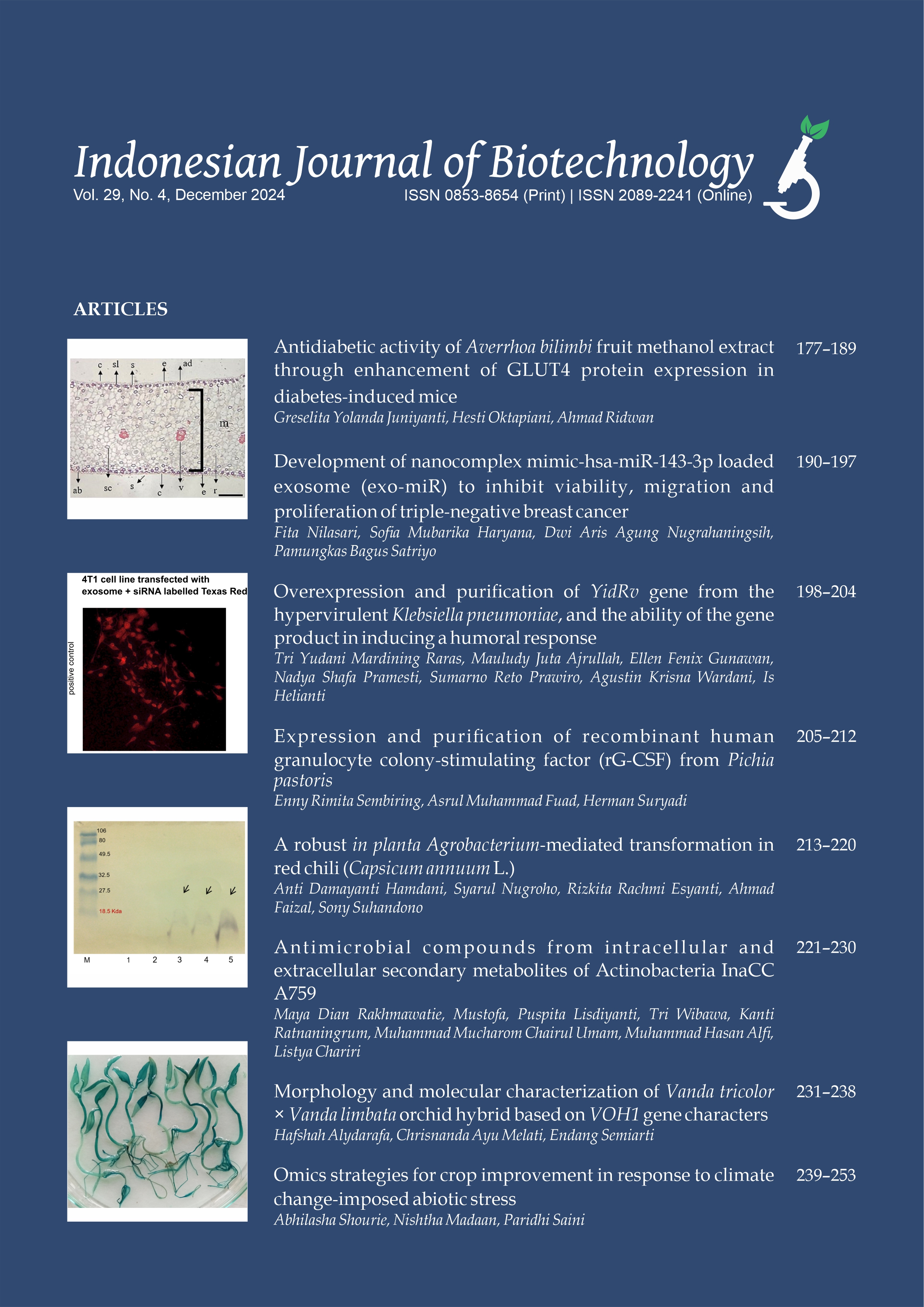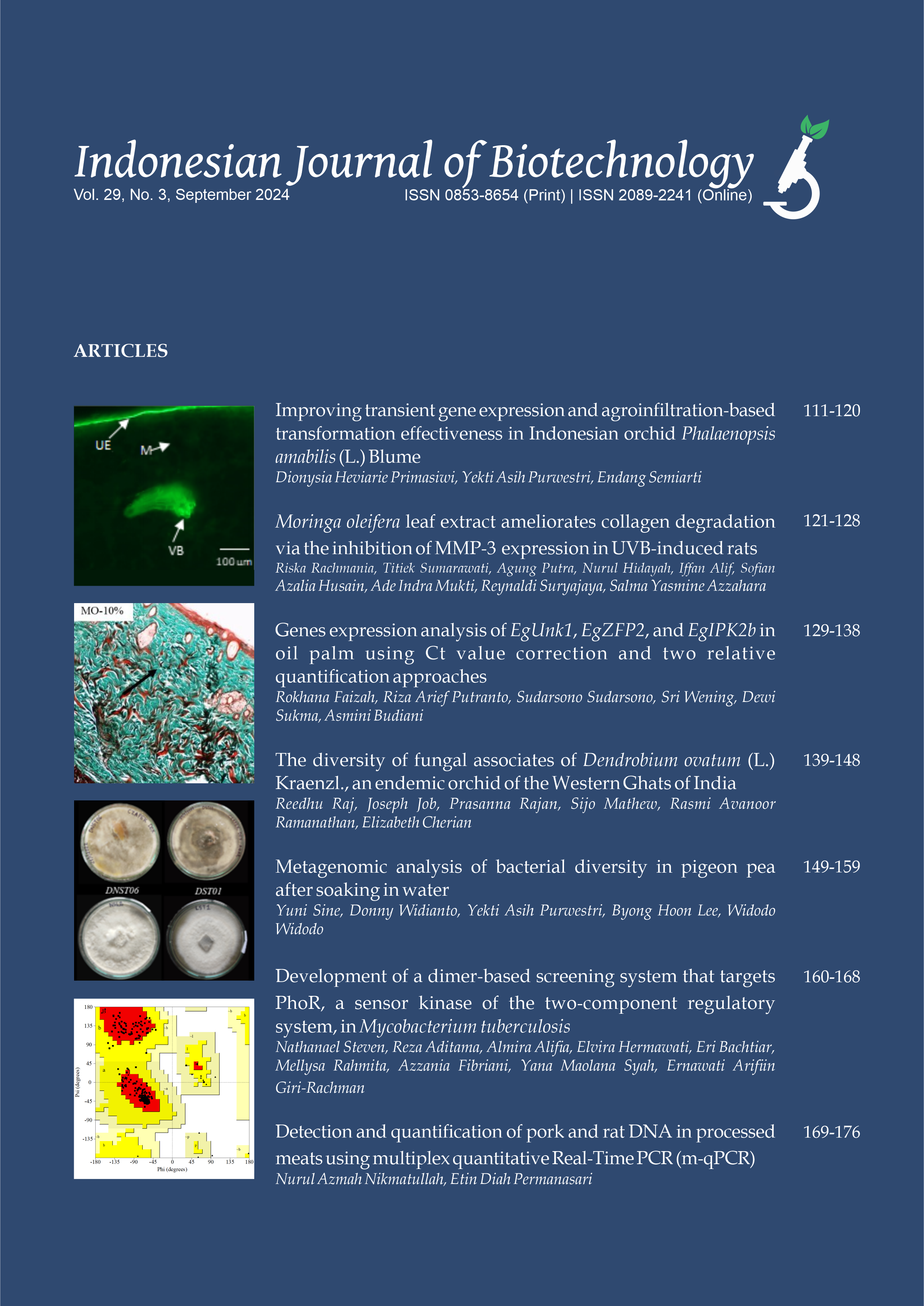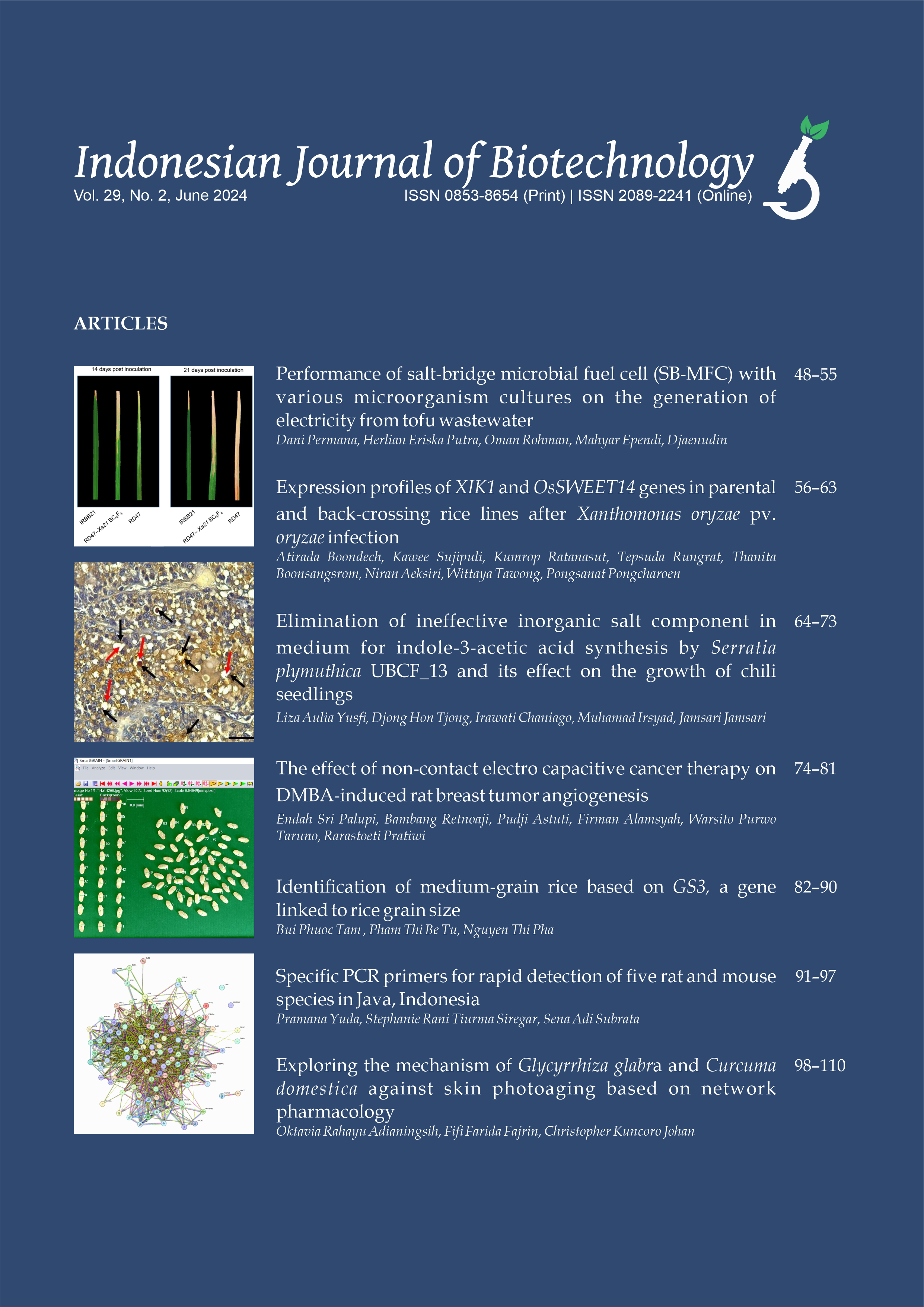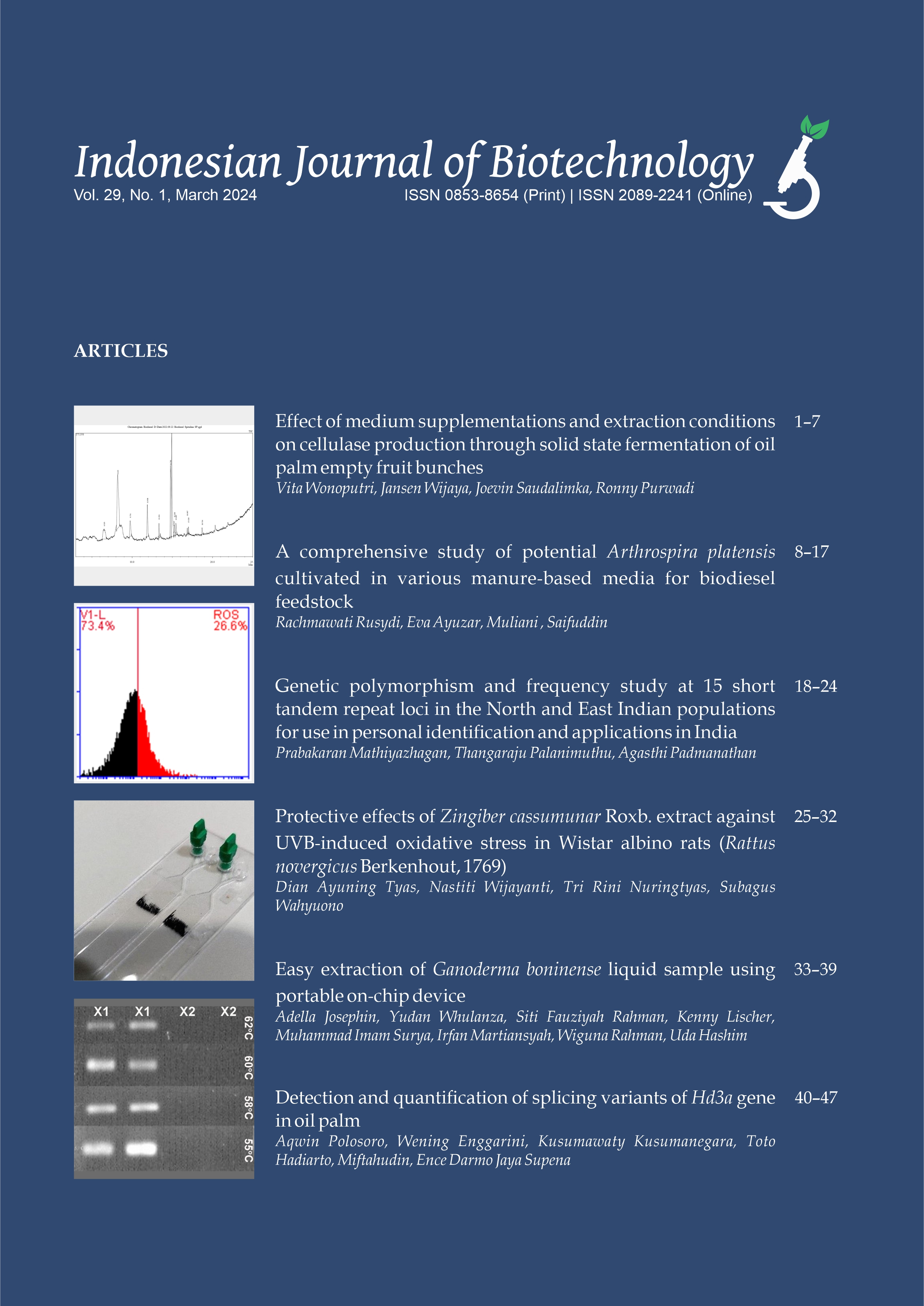Identification of gene expression location of angiotensin‐converting enzyme‐2 SNPs as a receptor for SARS‐CoV‐2 in different populations by using various databases
Dyah Aryani Perwitasari(1), Rita Maliza(2*), Bayu Tri Murti(3), Haafizah Dania(4), Athika Darumas Putri(5)
(1) Faculty of Pharmacy, Universitas Ahmad Dahlan, Yogyakarta, Indonesia 55164
(2) Study Program of Biology, Faculty of Science and Applied Technology, Universitas Ahmad Dahlan, Yogyakarta 55166
(3) Semarang College of Pharmaceutical Science (STIFAR), Semarang, Jawa Tengah 50192
(4) Faculty of Pharmacy, Universitas Ahmad Dahlan, Yogyakarta, Indonesia 55164
(5) Faculty of Pharmacy, Universitas Ahmad Dahlan, Yogyakarta, Indonesia 55164
(*) Corresponding Author
Abstract
The World Health Organization (WHO) has announced that Severe Acute Respiratory Syndrome Coronavirus‐2 (SARS‐CoV‐2) and Coronavirus disease (COVID‐19) is considered a worldwide pandemic. Rapidly rising numbers of patients have been reported in almost every country, along with the growing mortality rates. Uncontrolled growth in patient numbers may be due to reasons such as treatment options and vaccine availabilities and unidentified targets of SARS‐CoV‐2. Previous study has revealed that the molecular target of SARS‐CoV‐2 is analogous to SARS (2003), i.e. angiotensin‐converting enzyme‐2 (ACE‐2). Therefore, the determination of ACE‐2 may enrich existing information and facilitate development of drugs targeted toward SARS‐CoV‐2. This study aims to screen the expression of ACE‐2 genes and their relationship to the types of SNP variants in SARS‐CoV‐2. We explored a series of observations using powerful databases, e.g. GTEx portal, HaploReg, 1000 Genome and Ensembl, to identify the gene variant of ACE‐2. We showed that ACE‐2 is highly expressed in the testes and small intestine, while its lowest level is observed in lymphocytes. Subsequently, we observed 17 gene variants containing a missense mutation potentially damaging protein level. Among these genes, single nucleotide polymorphism (SNP) rs370187012 shows the highest damage‐level score, while the lowest effect is in SNP rs4646116. The highest frequency of the C allele was observed in European populations (1%). In addition to showing that ACE‐2 is expressed in several organs, we concluded that the ACE‐2 gene variation can be found in African, American, Southeast and East Asian, and European populations. The polymorphisms of ACE‐2 impact on the ACE2 protein structure and the binding capacity of the ACE‐2 receptor with the S‐Protein of SARS‐CoV‐2.
Keywords
Full Text:
PDFReferences
Ardlie KG, DeLuca DS, Segrè AV, Sullivan TJ, Young TR, Gelfand ET, Trowbridge CA, Maller JB, Tukiainen T, Lek M, et al. 2015. The GenotypeTissue Expression (GTEx) pilot analysis: Multitissue gene regulation in humans. Science. 348(6235):648–660. doi:10.1126/science.1262110.
AsiaEnsemble. 2020. Asia Ensemble. URL http://asia.ens embl.org/index.html. Calcagnile M, Forgez P, Iannelli A, Bucci C, Alifano M, Alifano P. 2020. ACE2 polymorphisms and individual susceptibility to SARSCoV2 infection: insights from an in silico study. BioRxiv .
Cao Y, Li L, Feng Z, Wan S, Huang P, Sun X, Wen F, Huang X, Ning G, Wang W. 2020. Comparative genetic analysis of the novel coronavirus (2019nCoV/SARSCoV2) receptor ACE2 in different populations. Cell Discovery. 6(1):1–4. doi:10.1038/s4142102001471.
Chaudhary M. 2020. COVID19 susceptibility: potential of ACE2 polymorphisms. Egypt J Med Hum Genet. 21(1). doi:10.1186/s43042020000999.
Devuyst O. 2015. The 1000 genomes project: Welcome to a new world. Peritoneal Dial Int. 35(7):676–677. doi:10.3747/pdi.2015.00261. GTExPortal. 2020.
Gene Page ACE2. URL https://gtexpo rtal.org/home/gene/ACE2. Guan Wj, Liang Wh, Zhao Y, Liang Hr, Chen Zs, Li Ym, Liu Xq, Chen Rc, Tang Cl, Wang T, et al. 2020. Comorbidity and its impact on1590 patients with COVID19 in China: a nationwide analysis. Eur Respir J. 55(5):2000547. doi:10.1183/13993003.005472020.Supp1.
HaploReg. 2020. HaploReg v4.1. URL https://pubs.broad institute.org/mammals/haploreg/haploreg.php. Hikmet F, Méar L, Edvinsson Å, Micke P, Uhlén M, Lindskog C. 2020. The protein expression profile of ACE2 in human tissues. Mol Syst Biol. 16(7). doi:10.15252/msb.20209610.
Hofmann H, Geier M, Marzi A, Krumbiegel M, Peipp M, Fey GH, Gramberg T, Pöhlmann S. 2004. Susceptibility to SARS coronavirus S proteindriven infection correlates with expression of angiotensin converting enzyme 2 and infection can be blocked by soluble receptor. Biochem Biophys Res Commun. 319(4):1216–1221. doi:10.1016/j.bbrc.2004.05.114.
Li W, Sui J, Huang IC, Kuhn JH, Radoshitzky SR, Marasco WA, Choe H, Farzan M. 2007. The S proteins of human coronavirus NL63 and severe acute respiratory syndrome coronavirus bind overlapping regions of ACE2. Virology. 367(2):367–374. doi:10.1016/j.virol.2007.04.035.
Li W, Zhang C, Sui J, Kuhn JH, Moore MJ, Luo S, Wong SK, Huang IC, Xu K, Vasilieva N, Murakami A, He Y, Marasco WA, Guan Y, Choe H, Farzan M. 2005. Receptor and viral determinants of SARScoronavirus adaptation to human ACE2. EMBO J. 24(8):1634– 1643. doi:10.1038/sj.emboj.7600640.
Liu M, Wang T, Zhou Y, Zhao Y, Zhang Y, Li J. 2020. Potential role of ACE2 in coronavirus disease 2019 (COVID19) prevention and management. J Transl Int Med. 8(1):9–19. doi:10.2478%2Fjtim20200003.
Lu R, Zhao X, Li J, Niu P, Yang B, Wu H, Wang W, Song H, Huang B, Zhu N, et al. 2020. Genomic characterisation and epidemiology of 2019 novel coronavirus: implications for virus origins and receptor binding. The Lancet 395(10224):565–574. doi:10.1016/S01406736(20)302518.
Paniri A, Hosseini MM, MoballeghEslam M, AkhavanNiaki H. 2021. Comprehensive in silico identification of impacts of ACE2 SNPs on COVID19 susceptibility in different populations. Gene Rep. 22. doi:10.1016/j.genrep.2020.100979.
Sommerstein R, Kochen MM, Messerli FH, Gräni C. 2020. Coronavirus disease 2019 (Covid 19): Do angiotensinconverting enzyme inhibitors/ angiotensin receptor blockers have a biphasic effect? J Am Heart Assoc. 9(7). doi:10.1161/JAHA.120.016509.
Worldometer. 2020a. Coronavirus Age, Sex, Demographics (COVID19) Worldometer. URL https://www.worldometers.info/coronavirus/corona virusagesexdemographics/. Worldometer. 2020b. COVID19 CORONAVIRUS PANDEMIC. URL https://www.worldometers.info/coro navirus/coronavirusagesexdemographics/.
Zhang H, Penninger JM, Li Y, Zhong N, Slutsky AS. 2020. Angiotensinconverting enzyme 2 (ACE2) as a SARSCoV2 receptor: molecular mechanisms and potential therapeutic target. Intensive Care Medicine 46(4):586–590. doi:10.1007/s00134020059859.
Zhao Y, Zhao Z, Wang Y, Zhou Y, Ma Y, Zuo W. 2020. SingleCell RNA Expression Profiling of ACE2, the Receptor of SARSCoV2. Am J Respir Crit Care Med. 202(5):756–759. doi:10.1164/rccm.202001 0179LE.
Zhou P, Yang XL, Wang XG, Hu B, Zhang L, Zhang W, Si HR, Zhu Y, Li B, Huang CL, et al. 2020. A pneumonia outbreak associated with a new coronavirus of probable bat origin. Nature 579(7798):270–273. doi:10.1038/s4158602020127.
Article Metrics
Refbacks
- There are currently no refbacks.
Copyright (c) 2021 The Author(s)

This work is licensed under a Creative Commons Attribution-ShareAlike 4.0 International License.









